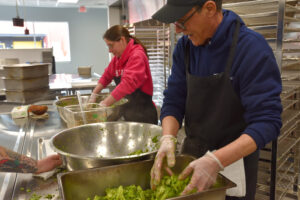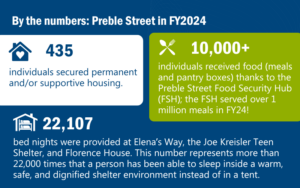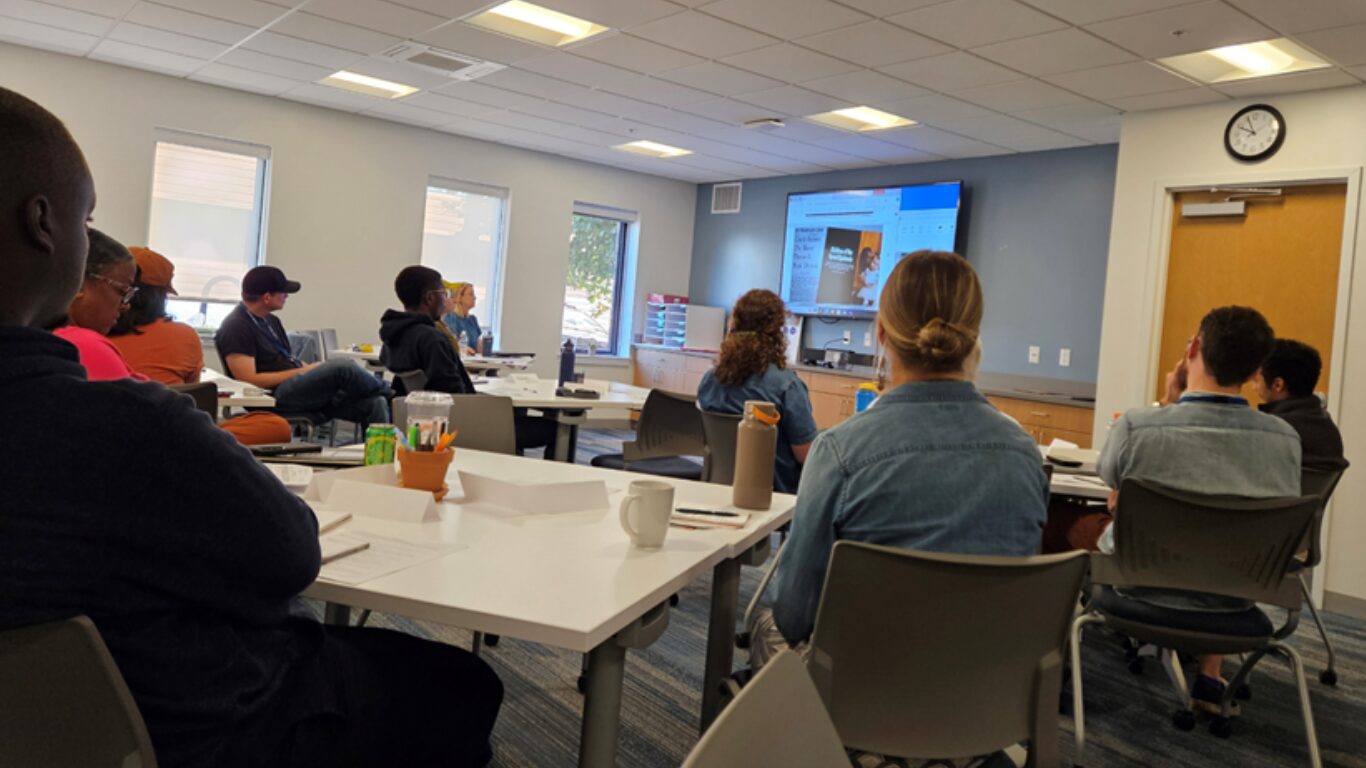Caption: Staff attending a recent Racial Health Equity training, led by Dr. Michelle Durham, an addiction medicine specialist and psychiatrist.
Preble Street is on an ongoing journey to become an anti-racist organization. We do this critical work informed by — and in partnership with — the people we serve.
Diversity, equity, and inclusion have been central to the work in Preble Street programs and our workplace for decades. At Preble Street, we see firsthand the impacts of structural inequality and discriminatory policies. A 2020 calculation of people accessing services in ten Preble Street programs showed that 22% are BIPOC (Black, Indigenous, or People of Color) – more than three times the percentage of BIPOC in Maine at the time.
Racial Equity Working Group
During the pandemic, Preble Street refocused and expanded its racial equity efforts through training and an organization-wide Racial Equity assessment. In May 2022, Preble Street received the results of its first-ever Racial Equity assessment, a process that further committed the organization to transform its work in ways that create and promote equity. This report illuminated a number of recurring themes, including the need for more transparency and accountability and the need to invest in organizational culture.
Preble Street’s Racial Equity Committee, first established in 2018, early this year launched two subcommittees to deepen our work on racial equity and find new, productive ways to engage staff in a communal setting in racial equity work and trainings.
The two subcommittees consist of an Employee Resource Group, centering the voices and experiences of BIPOC staff, and a Learning Group, an educational, discussion-based group. Both conduct monthly meetings and are open to all staff to provide a platform and opportunity for staff to explore topics and questions related to racial equity and our work in Preble Street programs. All members of the Preble Street senior leadership team are doing racial equity work in parallel with these subcommittees.
BIPOC Client Assistance Fund
In 2024, Preble Street established a client assistance fund to provide direct support to BIPOC clients for basic needs and to address systemic inequities they may face in accessing care, essential services, educational opportunities, and more. This fund was an essential resource for 65 individuals across eight programs and three partner organizations: Pine Tree Legal, Spurwink, and Maine Access Points.
The fund provided vital support, improving daily life by helping with rent, purchasing household items, stabilizing finances, and reducing the risk of homelessness. These funds supported educational opportunities, like formal education and vocational training, which led to more and better employment opportunities. It also provided greater access to transportation, so clients could get to job interviews, educational programs, and appointments. Utility assistance also helped maintain essential services like electricity, heating, and water. Access to quality healthcare was another major focus area, as the fund covered medical expenses and necessary services.
The impact of this support extends far beyond immediate financial relief, reducing stress for many clients, helping to improve physical health, and empowering them with educational opportunities to create a better future. With this aid, numerous individuals have found renewed hope and motivation, allowing them to take decisive steps toward achieving their personal goals and improving their overall well-being.
Racial Equity is Health Equity
Our stories matter. They empower, they humanize, and when we ask people questions, dig deeper, go beyond the surface level... you learn something about them.
Dr. Michelle Durham
Moving beyond the Racial Equity Committee and direct client support, Preble Street conducts various trainings for staff, grounded in race equity. Recently, staff attended a Racial Health Equity training, led by addiction medicine specialist and psychiatrist, Dr. Michelle Durham.
Dr. Durham led staff through an exploration of healthcare, housing, and educational disparities among racial and ethnic groups in the U.S., identifying what systemic factors have historically led to these gaps in outcome.
Trainings like this provide staff with important knowledge about how homelessness affects BIPOC communities and what steps we can take at the systems-level and as individuals to promote racial equity. In this training, Preble Street staff discussed how as individuals, people can recognize our biases and contribute to a culture that values difference. Likewise, at the systems-level, Dr. Durham talked about the types of legislation and policies at the local, state, and federal levels that Preble Street can support to address housing, healthcare, and other disparities among racial groups in Maine and the U.S.
Preble Street is a social work organization, and embedded in its work is an understanding that equity is fundamental to social justice. The work of Preble Street to promote equity throughout the agency culture is an ongoing effort that requires continued engagement and a multi-dimensional approach.
We are committed to this effort and to becoming an anti-racist organization.
To learn more, visit https://www.preblestreet.org/equity-and-inclusion.
Continue reading...

Food Is a Human Right: Protecting Access to Nutrition in Maine
In honor of National Nutrition Month, we take a look at the emergency food system in Maine. Food pantries and anti-hunger non-profits like Preble Street play an important role in ensuring people experiencing food insecurity have consistent access to healthy and nutritious food. Since opening in 1975, Preble Street has worked to ensure that everyone

The power of advocacy
For 50 years, Preble Street has advocated for keeping people in Maine fed, sheltered, and housed. We are deeply committed to lifting up the voices of marginalized and underserved populations, bringing people together to focus on solutions, and ensuring that everyone in our state has food, clothing, and shelter. As a social work agency, we

Feeding, housing, and sheltering more people than ever before
For 50 years, Preble Street has been here – expanding far beyond a handful of social work interns in Portland to more than 325 full and part-time staff and programs that touch every county in Maine. Preble Street is just one piece of the puzzle to solve hunger, homelessness, and poverty in Maine. To find

